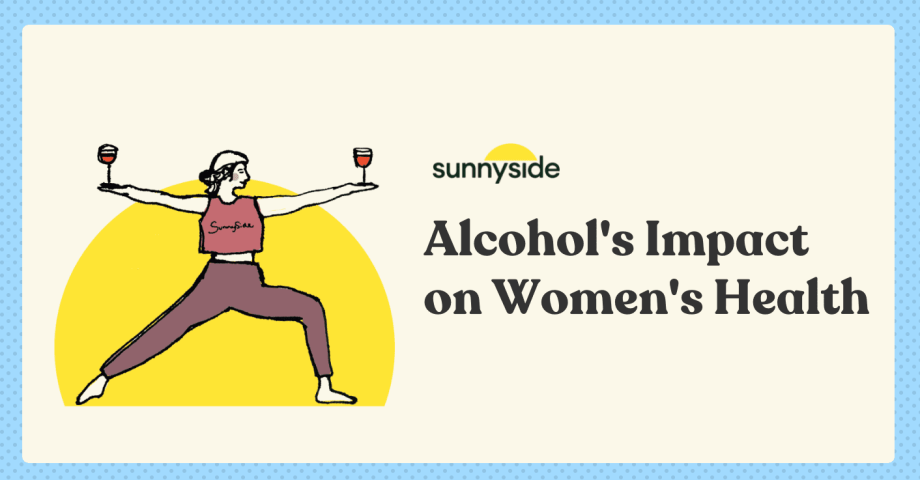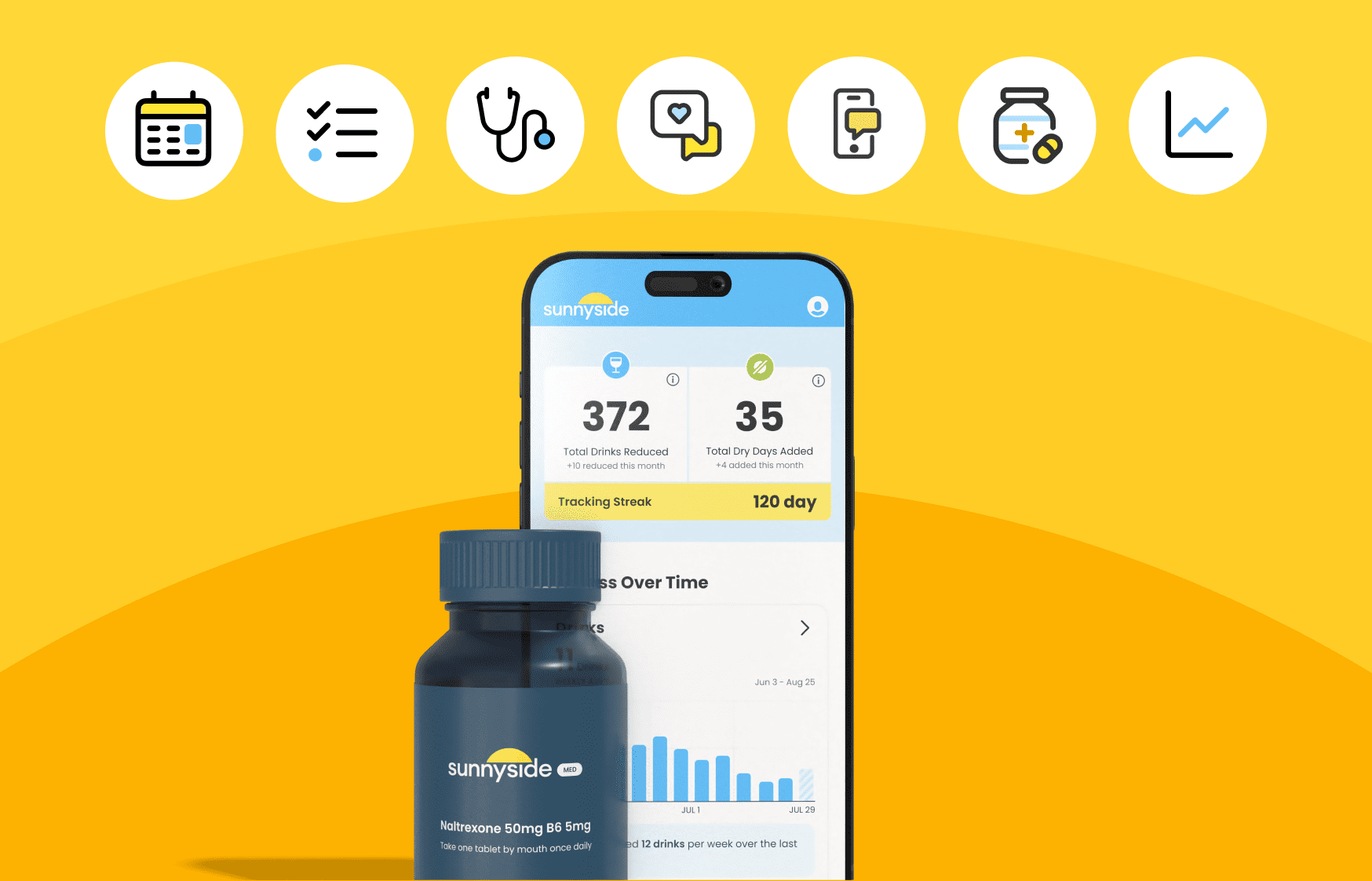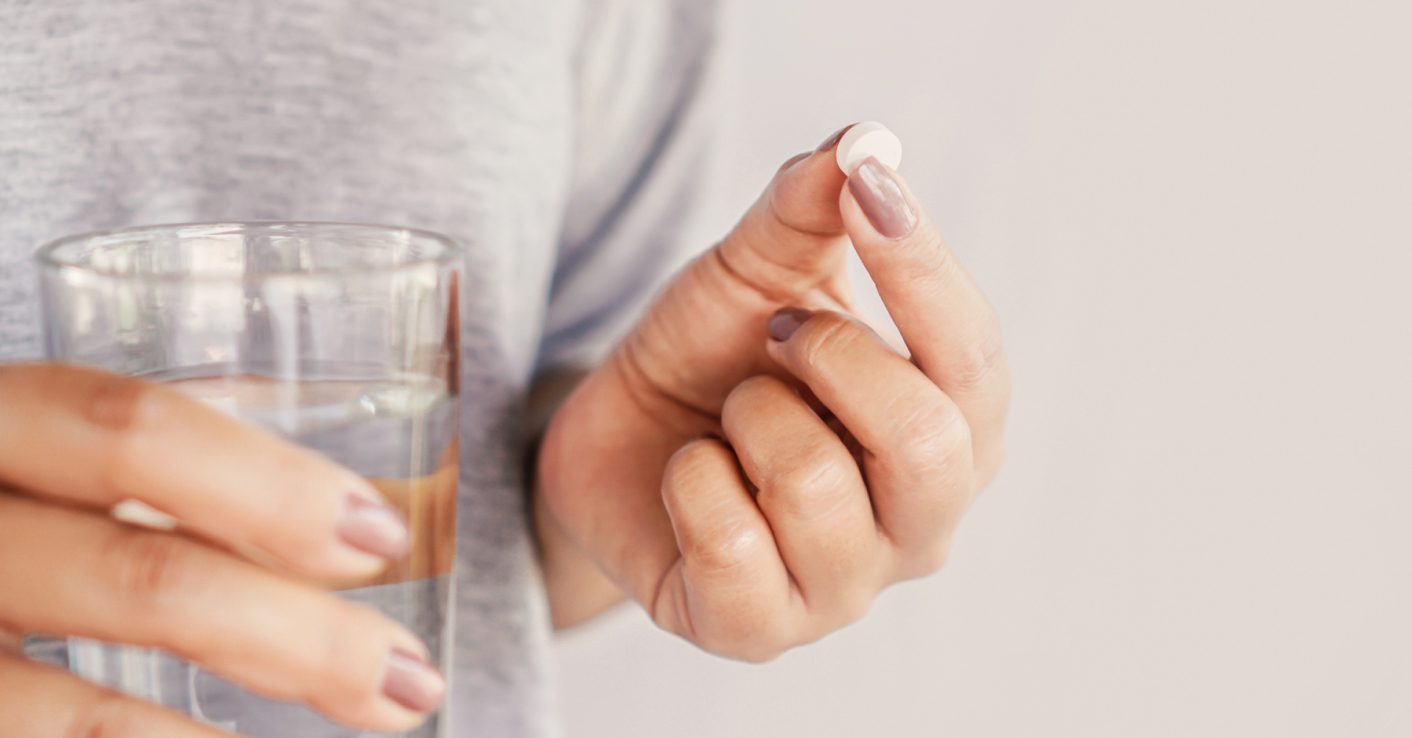Last Updated on May 19, 2023
If you didn’t already think it was hard enough being a woman, well you might want to guess again. In a recent video interview with Dr. Hrishikesh Belani and Dr. Karina Celaya, we discussed the various ways alcohol impacts women’s health, and why drinking alcohol mindfully is crucial to living a healthy and empowering lifestyle.

Dr. “Hrishi” Belani MD is assistant clinical professor of medicine at UCLA and associate medical director of the South Los Angeles Health Center Group. Hrishi is trained in internal medicine and is a primary care provider focusing on patients with substance use disorders as well as patients living with HIV. Hrishi has a background in drug use and public health and before medicine, worked at the CDC to help countries curb dual epidemics of injection drug use and HIV. Hrishi is also a Sunnyside advisor and has helped review our approach and content since 2020.

Dr. Karina Celaya is a Board Certified OB/GYN and works for the Department of Health Services in Los Angeles County at the Hubert Humphrey Comprehensive Health Center. She is an Assistant Professor in the Dept. of OBGYN at Harbor UCLA Medical Center and works to coordinate care across LA County. She is particularly interested in using public health principles to optimize health care delivery and reduce health disparities in Women’s Health.
Naturally the first step towards improving your relationship with alcohol is to educate yourself on the short-term and long-term effects. Who better to learn from than medical professionals who have dedicated their lives to understanding addiction and women’s health and bodies?
How Does Alcohol Impact Women’s Health?
This article summarizes a few key points from our 30-minute conversation. If you are interested in getting a more comprehensive understanding of the how alcohol impacts women’s health in more detail, watch the full video:
Take the 3-min quiz1) How alcohol impacts women’s sexual health and libido
Libido is the overall sex drive or level of desire one experiences. It can be influenced by a variety of different factors including hormone levels, underlying illness, medications, as well as drug and alcohol use.
Libido is also impacted by psychological factors including stress, anxiety, depression and the health of the relationship with the partner.
The prevalence of low libido is relatively common, with up to 46% of women in the US experiencing it at some point in their lives.
This issue peaks in the 45-64 year old age group, at about 15% of women.
The true nature of the association is unclear, but alcohol intake can have either a positive or negative effect depending on how much is consumed.
In lower doses, or with more mindful alcohol consumption, women can experience a slight euphoria, which can lead some people to being more open to sexual activity. At higher doses alcohol leads to the opposite effect.
This is because alcohol is a central nervous system depressant that slows down brain function, breathing and blood flow. This can lead to reduced vaginal lubrication. In other words, alcohol consumption can lead to lower physiological arousal.
The influence of anxiety and depression on women’s libido
Alcohol can also have a strong impact on anxiety and depression. If anxiety is present, alcohol is commonly used as a form of self-medication to alleviate the feelings of anxiety or depression.
This can be a slippery slope leading to more anxiety from the negative effects of too much alcohol, and also potentially excessive alcohol use which could lead to a higher dependence on alcohol.
A study on the association between alcohol use and Female Sexual Disfunction (FSD) also found that women with higher tendencies of depression and anxiety were at higher risk for hazardous drinking practices, resulting in a higher likeliness FSD.
In fact, 57% of the 1,649 sexually active women in the study were classified as having FSD and 80% of those with FSD reported using alcohol regularly, and 38% reported drinking patterns with the potential to be hazardous.
2) Alcohol and the impact on hormonal changes and menstrual cycles
According to Dr. Celeya, there are a number of studies that have found an association with moderate to heavy drinking, and irregular menses as well as dysmenorrhea (painful periods). Some studies looking at infertility and alcohol show reduced ovulatory dysfunction. What this means is that in some cases of alcohol use or abuse, ovaries may stop ovulating as they should.
In some cases, women who drink may not have a period at all. There have also been studies indicating that alcohol exposure could lead to the uterus being deprived of estrogen entirely.
In addition, alcohol consumption is known to temporarily increase testosterone levels. Because testosterone is a well–known suppressor of the hypothalamic–pituitary unit (which links the nervous and endocrine systems by way of the pituitary gland and which plays an important role in metabolism and female hormone regulation), an increase in testosterone could therefore disturb normal female cycling.
Another thing to consider is that middle-aged or older women who drink excessively may have up to a 41% increased risk of developing breast cancer, and the risk can increase linearly with consistent consumption throughout this range. It becomes more and more important for women, especially as they age, to drink mindfully and incorporate alcohol free days into their lives.
3) Alcohol’s influence on preparing for pregnancy and breastfeeding
As Dr. Celeya explains, half of all births in the US are unintended, which can create a tricky situation for women who drink alcohol and don’t realize they’re pregnant. Within the first 6-8 weeks of pregnancy significant development of the fetus takes place, so alcohol consumption during that period wouldn’t be recommended. But what if you don’t know?
Thankfully the prevalence of fetal alcohol syndrome, the most severe result of prenatal drinking, is rare and affects less than 1% of women. This results in central nervous system abnormalities, growth defects, and issues with the baby’s facial structure.
Even though it’s rare, there are many children who have neurobehavioral defects caused by exposure to alcohol in pregnancy, and this is usually seen later as behavioral disorders, impaired intellectual development or some central nervous system impairment.
When it comes to breastfeeding, alcohol consumption during lactation is associated with altered postnatal growth, sleep patterns and psychomotor patterns of the offspring.
After breastfeeding is established, a mother should wait at least 3 to 4 hours after a single drink to minimize exposure to the child. There are also test strips sold to identify alcohol in the breast milk as a preventive step. So if you’re planning on drinking while breastfeeding, just stay mindful of the timing.
At Sunnyside we never condemn drinking, but we also don’t condone binge drinking. So if you’re consuming alcohol mindfully, your personal health and wellness should generally be protected. If you have concerns that you may be pregnant, please seek the advice of a clinician regarding alcohol consumption.
4) Does the risk of alcohol dependence differ between men and women?
According to Dr. Hrishi Belani, females are equally as likely to develop alcohol use dependence as males, however it tends to be more common among males. That being said, women may have a higher risk of relapse or cravings of alcohol.
On top of that, females tend to metabolize alcohol differently, which often results in faster intoxication. Women also tend to have more serious health complications from alcohol use disorder, such as increased alcohol-related accidents, heart disease, stroke and liver disease.
Some signals women can look out for proactively is getting frequent checkups from their healthcare practitioners and looking into liver enzyme abnormalities, lipid disorders, high blood pressure, high blood sugar and anemia, since these can all be indications of heavy drinking patterns.
5) Is marijuana a safe alternative to drinking alcohol for women?
Dr. Hrishi Belani also spoke about the concept of “California sober”, or the idea of replacing or substituting alcohol with cannabis instead. And although this approach may work for some people, it appears that this is mostly anecdotal.
In the event that someone actually suffers from an addiction or dependence on alcohol, then this practice may just perpetuate addiction.
Cannabis can also lead to negative outcomes, such as panic, nausea, poor concentration, etc.
If someone has a dependency on alcohol, replacing it with mirjuana might just lead to replacing one dependency for another, which may not have huge benefits as there are often psychosocial issues that go along with dependence disorder which need to be addressed.
That being said, much like drinking alcohol mindfully is the recommended way to consume alcohol and prioritize wellness, the same can be said for mindfully consuming cannabis. For most people, there is likely a balance that can be discovered with a mindful approach.
6) How else does alcohol influence women’s health and mental health?
In past studies conducted at Sunnyside, we explored a variety of ways that alcohol impacts women, including triggers for drinking, common types of alcohol consumed by women, and even the impact of marital status on drinking frequency.
When asked, we found that the majority of women surveyed, close to 51%, were drinking 6-15 drinks per week. For women, this suggests the majority surveyed are excessive drinkers. And in terms of the type of alcohol most favored, wine was a common drink of choice among women with 38% of respondents indicating drinking almost exclusively wine.
Many women also indicated that stress and decompressing were major triggers when it came to drinking.
In fact, when asked how various stressful events influenced drinking behavior, 47% of women stated they were drinking more due to the repeal of Roe. V. Wade, while 48% indicated drinking more due to frequent mass shootings in the US.
Conclusion
Alcohol can impact women in many ways, and it’s important for women, especially as they get older to continue to practice mindful drinking if they do plan to drink alcohol. Planning and tracking your drinking can help keep you in good health, and also has benefits such as weight loss, healthier skin, better reproductive function, and improved libido.
If you’re hoping to improve your relationship with alcohol and build better drinking habits overall, take Sunnyside’s 3-min quiz to build your personalized plan, and improve your overall wellness.
Sources:
- ACOG (American College of Obstetricians and Gynecology) Practice Bulletin: Female Sexual Dysfunction, Number 213, July 2019.
- ACOG Committee Opinion: At-Risk Drinking and Alcohol Dependence: Obstetric and Gynecologic Implications, No. 496, August 2011.
- Grodstein et al. Infertility in women and moderate alcohol use. American J Public Health, 84(9) Sept 1994.
- Kling et al. associate Between Alcohol Use and Female Sexual Dysfunction From the Data Registry on Experiences of Aging, Menopause, and Sexuality (DREAMS). Sexual Medicine, 7(2) June 2019.



